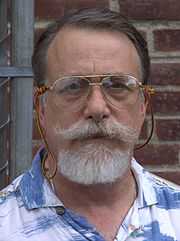Hugh Loebner

Hugh Loebner (born March 26, 1942) is notable as the sponsor of the Loebner Prize, an embodiment of the Turing test. He is an American inventor, holding six United States Patents. He is also an outspoken social activist for the decriminalization of prostitution.
Loebner prize
Loebner established the Loebner Prize in 1990. He pledged to give $100,000 and a solid gold medal to the first programmer able to write a program whose communicative behavior can fool humans into thinking that the program is human. The competition is repeated annually and has been hosted by various organizations. Within the field of artificial intelligence, the Loebner Prize is somewhat controversial; the most prominent critic, Marvin Minsky, has called it a publicity stunt that does not help the field along.
Loebner also likes to point out that, unlike the solid gold medal for the Loebner prize, the gold medals of the Olympic Games are not solid gold, but are made of silver covered with a thin layer of gold.[1]
Fascinated by Alan Turing's imitation game, and considering creating a system himself to pass it, Loebner realised that even if he were to succeed in developing a computer that could pass the Turing test, no avenue existed in which to prove it.
In his letter of December 30, 1988 to Dr. Robert Epstein , Loebner authorized Dr. Epstein to move forward with a contest, and referring to the Turing Test, Loebner wrote: "Robert, in years to come, there may be richer prizes, and more prestigious contests, but gads, this will always be the oldest." Establishing the Loebner Prize, he introduced the Turing Test to a wider public, and stimulated interest in this science. It remains Hugh Loebner’s desire to advance AI, and for the Turing Test to serve as a tool to measure the state of the art: "There is a nobility in this endeavour. If we humans can succeed in developing an artificial intellect it will be a measure of the scope of our intellect" (from: In Response, 1994) .
Prostitution
Loebner has been quite open about his visits to prostitutes.[1] In 1994, after a campaign by officials in New York City to arrest customers of prostitutes, he wrote an opposing letter to The New York Times, and it was published.[2] In 1996 he authored a Magna Carta for Sex Work or Manifesto of Sexual Freedom,[3] in which he denounced the criminalization of consensual sexual acts, and asked all like minded people to join a protest on 6/9/96 (a play on the 69 sex position). In interviews he has said that he believes himself to be too old for the young attractive women he is interested in; they would not have sex with him were it not for the money. He has compared the oppression of prostitutes and their customers to the oppression that Alan Turing faced because of his homosexual behavior.
Personal life
Loebner holds a Ph.D. in demography from the University of Massachusetts Amherst, Amherst. He is divorced, lives in New York City and owns Crown Industries, a manufacturer of crowd control stanchion and brass fittings, which is the major sponsor of the Loebner Prize in the US.
References
- ↑ 1.0 1.1 Artificial stupidity, Salon.com, 16 February 2003
- ↑ Arrests, The New York Times, 18 August 1994
- ↑ Magna Carta for Sex Work